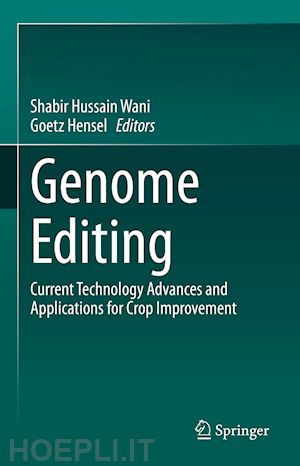
Questo prodotto usufruisce delle SPEDIZIONI GRATIS
selezionando l'opzione Corriere Veloce in fase di ordine.
Pagabile anche con Carta della cultura giovani e del merito, 18App Bonus Cultura e Carta del Docente
S.No
Tentative Chapter Title
Author Details
enhancing crop traits: Lessons from
CRISPR/Cas9
Tariq Shah and Aziz Khan*
College of Agriculture, Guangxi University, Nanning, China
Email: azizkhanturlandi@gmail.com
Commercialization of CRISPR derived Crops: Current Status and future prospects
Dr. Martin A Lema
Universidad Nacional de Quilmes, Roque Sáenz Peña 180, B1876BXD Bernal, Buenos Aires, Argentina. Email: mlema@unq.edu.ar
Targeted allele recombination for precise mapping in plant breeding
Dr. Eyal Fridman
Department of vegetables and field crops, Institute of Plant Science, Agricultural Research Organization, The Volcani Center, Rishon LeZion 7505101, Israel
Email: fridmane@volcani.agri.gov.il
Hindex: 28
Applications of gene drive for weeds and pest management using CRISPR/CAS9 system in plants
Dr. Kathleen Hefferon
Food Science and Technology, College of Agriculture and Life Sciences, Cornell University, Ithaca, NY, USA
Email: klh22@cornell.eduHindex: 14
Genome editing by Ribonucleorotein based delivery of CAS9 system in plants
Karina Morales, Michael J. Thomson
Professor and HM Beachell Endowed Chair in International Rice Improvement
Dept. of Soil and Crop Sciences, Texas A&M University / Texas A&M AgriLife Research
370 Olsen Blvd., 2474 TAMU, College Station, TX 77843-2474
Email: email: m.thomson@tamu.edu
Hindex: 28
Virus mediated delivery of CRISPR/CAS9 system in plants
Dr. Monika Bansal,Women scientist-A (completed)
School of Agricultural biotechnology,
Punjab Agricultural university, LudhianaDr. Shabir Hussain Wani
Sher-e-Kashmir University of Agricultural Sciences and Technology of Kashmir, J&K, India
Email:shabirhwani@skuastkashmir.ac.in
Hindex: 24
Epigenetic and chromosomal Rearrangements in genome editing
Neha Goel (Ph.D.)
Genetics and Tree Improvement
Forest Research Institute, DehradunEmail:goelneha6@gmail.con
Dr. Shabir Hussain Wani
Sher-e-Kashmir University of Agricultural Sciences and Technology of Kashmir, J&K, India
Email:shabirhwani@skuastkashmir.ac.in
Hindex: 24
Multiplexed genome editing in plants for improvement of various traits using CRISPR/CAS9 based system
Dr. Goetz Hensel
Leibniz Institute of Plant Genetics and Crop Plant Research (IPK)
Plant Reproductive Biology
Corrensstr. 3
D-06466 Seeland/OT Gatersleben
GERMANY
Email: hensel@ipk-gatersleben.deHindex: 33
Application of CRISPR CAS9 for regulation of epigenetic traits in plants
Abdullah Makhzoum
Department of Biological Sciences and Biotechnology, Botswana International University of Science and Technology, Palapye, Botswana; Correspondenceabmakhzoum@gmail.com
Hindex: 10
Dr. Goetz Hensel
Leibniz Institute of Plant Genetics and Crop Plant Research (IPK)
Plant Reproductive Biology
Corrensstr. 3
D-06466 Seeland/OT Gatersleben
GERMANY
Email: hensel@ipk-gatersleben.de
Hindex: 33
Department of Crop Genetics, John Innes Centre, Norwich Research Park, Norwich NR4 7UH, UK
Email: penny.hundleby@jic.ac.uk
Prof. Mehboob Rahman
Group Leader Plant genomics & Mol. Breeding Lab, National Institute for Biotechnology & Genetic Engineering (NIBGE), PO Box 577, Jhang Road, Faisalabad, Pakistan.
Email: mehboob_pbd@yahoo.com
H index 23
Dr. Kathleen Hefferon
Food Science and Technology, College of Agriculture and Life Sciences, Cornell University, Ithaca, NY, USA
Email: klh22@cornell.eduH index 14
Dr. Muhammad Qudrat Ullah Farooqi
School of Agriculture and Environment; Faculty of Science
The University of Western Australia, Perth WA 6009 Australia
Email: muhammadqudratullah.farooqi@uwa.edu.au
Dr. Rajesh Mehrotra
Birla Institute of Technology and Science (BITS-Pilani), Rahashthan, India
Email:
rmehrotra@pilani.bits-pilani.ac.in
Dr. Purvalohan Bhalothia
Email: purvalohan@gmail.com
H index 16
Dr Sandeep Kumar,
Assistant Professor,Department of Zoology,
KU SSJ Campus, Almora, Uttarakhand,India
Email: sandeep.ento@gmail.comDr Ananda Sarkar
National Institute of Plant Genome Research (NIPGR), Jawaharlal Nehru University Campus, Aruna Asaf Ali Marg, New Delhi, Delhi, 110067, India
Email:aksarkar@nipgr.ac.in
Hindex 17
phimakumari@gmail.com
Division of Plant Physiology
ICAR-Indian Agricultural Research Institute, New Delhi, IndiaEmail: viswa_iari@hotmail.com
Hindex : 37
Dr Seema Pradhan and Dr Ajay Parida,
Director,
Institute of Life Sciences, Bhubaneswar, India
Email: drajayparida@gmail.com, director@ils.res.in
Dr. Seema PradhanEmail: seemapradhan3@gmail.com











Il sito utilizza cookie ed altri strumenti di tracciamento che raccolgono informazioni dal dispositivo dell’utente. Oltre ai cookie tecnici ed analitici aggregati, strettamente necessari per il funzionamento di questo sito web, previo consenso dell’utente possono essere installati cookie di profilazione e marketing e cookie dei social media. Cliccando su “Accetto tutti i cookie” saranno attivate tutte le categorie di cookie. Per accettare solo deterninate categorie di cookie, cliccare invece su “Impostazioni cookie”. Chiudendo il banner o continuando a navigare saranno installati solo cookie tecnici. Per maggiori dettagli, consultare la Cookie Policy.